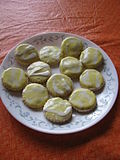Royal icing
Introduction
Royal icing is a type of icing that is commonly used in cake decoration and other sweet treats. It is known for its smooth and hard-drying properties, making it ideal for intricate designs such as piping and flooding on cookies, cakes, and other pastries.
History
The term "royal icing" was first used in the late 18th century. It was named "royal" because it was used on the wedding cake of Queen Victoria and Prince Albert in 1840. Since then, it has been a staple in many royal weddings and has become a popular choice for cake decorators around the world.
Ingredients
The main ingredients of royal icing are egg whites, powdered sugar, and sometimes lemon juice or other flavorings. Some recipes may also include cream of tartar or glycerin to improve the consistency and drying time.
Preparation
To prepare royal icing, the egg whites are first beaten until they are frothy. The powdered sugar is then gradually added and the mixture is beaten until it is smooth and glossy. If desired, flavorings such as lemon juice can be added at this stage. The icing should be used immediately or stored in an airtight container to prevent it from drying out.
Uses
Royal icing is often used for cake decorating because it dries hard and smooth, making it ideal for creating intricate designs. It is also commonly used for cookie decorating, as it can be easily piped onto cookies and will hold its shape as it dries. In addition, royal icing can be used to create decorative flowers and other shapes that can be used as cake toppers.
Storage
Royal icing can be stored in an airtight container at room temperature for up to a week. However, it should be stirred before use to ensure that it is smooth and even.
Conclusion
Whether you're a professional cake decorator or a home baker, royal icing is a versatile and useful tool to have in your baking arsenal. With its smooth finish and hard-drying properties, it's the perfect choice for creating beautiful and intricate designs on cakes, cookies, and other sweet treats.
See Also
Transform your life with W8MD's budget GLP-1 injections from $125.
W8MD offers a medical weight loss program to lose weight in Philadelphia. Our physician-supervised medical weight loss provides:
- Most insurances accepted or discounted self-pay rates. We will obtain insurance prior authorizations if needed.
- Generic GLP1 weight loss injections from $125 for the starting dose.
- Also offer prescription weight loss medications including Phentermine, Qsymia, Diethylpropion, Contrave etc.
NYC weight loss doctor appointments
Start your NYC weight loss journey today at our NYC medical weight loss and Philadelphia medical weight loss clinics.
- Call 718-946-5500 to lose weight in NYC or for medical weight loss in Philadelphia 215-676-2334.
- Tags:NYC medical weight loss, Philadelphia lose weight Zepbound NYC, Budget GLP1 weight loss injections, Wegovy Philadelphia, Wegovy NYC, Philadelphia medical weight loss, Brookly weight loss and Wegovy NYC
|
WikiMD's Wellness Encyclopedia |
| Let Food Be Thy Medicine Medicine Thy Food - Hippocrates |
Medical Disclaimer: WikiMD is not a substitute for professional medical advice. The information on WikiMD is provided as an information resource only, may be incorrect, outdated or misleading, and is not to be used or relied on for any diagnostic or treatment purposes. Please consult your health care provider before making any healthcare decisions or for guidance about a specific medical condition. WikiMD expressly disclaims responsibility, and shall have no liability, for any damages, loss, injury, or liability whatsoever suffered as a result of your reliance on the information contained in this site. By visiting this site you agree to the foregoing terms and conditions, which may from time to time be changed or supplemented by WikiMD. If you do not agree to the foregoing terms and conditions, you should not enter or use this site. See full disclaimer.
Credits:Most images are courtesy of Wikimedia commons, and templates, categories Wikipedia, licensed under CC BY SA or similar.
Contributors: Prab R. Tumpati, MD






